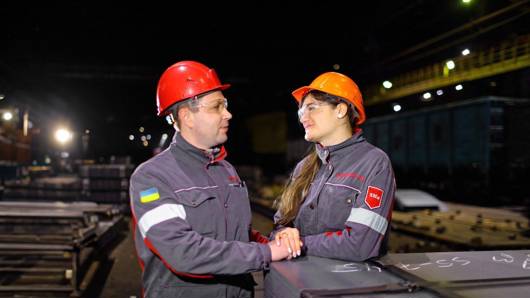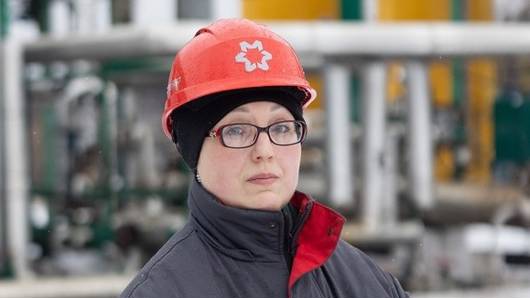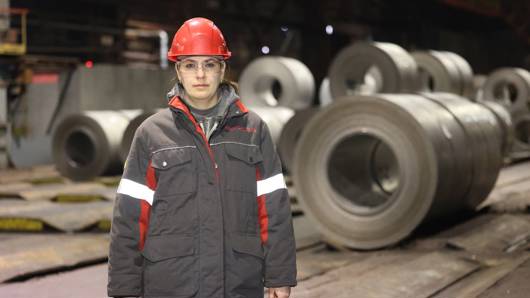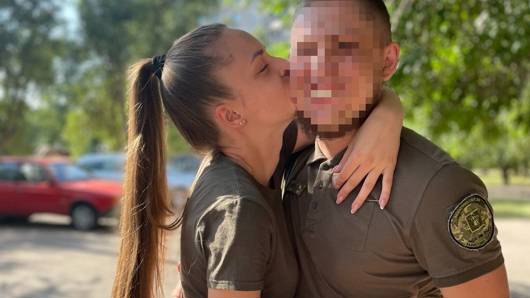After recovering from a severe shrapnel wound sustained on the front lines, Vadym Yavtushenko returned to the Inhulets ore mining and processing plant (GZK). Before the war, he was a shovel operator, in the combat zone he was a paratrooper, and today he works as a quarry dispatcher. The hero shares his story of peaceful times, military training, service, surgical miracles, and future dreams.
In Kryvyi Rih region, pursuing a career in mining is quite common. Vadym Yavtushenko, a native of Mohylivka village, didn't hesitate after finishing high school. Following example of his father who worked as a shovel operator in a quarry, he enrolled in the mining faculty as well. Vadym excelled in his studies and simultaneously interned at Inhulets GZK. By the time he graduated as a mining engineer, he had also earned his shovel operator's licence.
"I joined Inhulets GZK in 2012. I moved from Mohylivka to Inhulets to live closer to work. Over time, I operated various excavators. Before the war, I was part of the third mining sector in the crew of shovel number 86. Although I had trained as a dispatcher, I always preferred working with the equipment. Even now, I’d love to continue working in ore extraction, but because of the injury I sustained on the front lines, I am unable to. So, I'm putting my dispatcher skills to use again," says Vadym YAVTUSHENKO.
From training camp to the front lines
On 24 February 2022, the city was shaken awake by a series of powerful explosions, signalling the start of the full-scale war. Initial confusion quickly turned into solidarity and readiness for action, as people prepared to fight, volunteer, defend, or continue working. When the draft notice reached his village, Vadym went to the military recruitment office. He could choose between the Territorial Defence Forces (TDF), the National Guard, or the Air Assault Forces. He decided to join the paratroopers.
"I had never served in the army, but I realised that going to war was inevitable. So, I wanted proper training. The Air Assault Forces are known for their tough training, and we were stationed in Zhytomyr Region. I have to give credit to our instructors – they taught us everything they knew. In addition to learning how to use various firearms and artillery, we focused heavily on military discipline and brotherhood. Eventually, our unit that was part of the 95th Separate Air Assault Brigade was sent to the Donetsk axis."
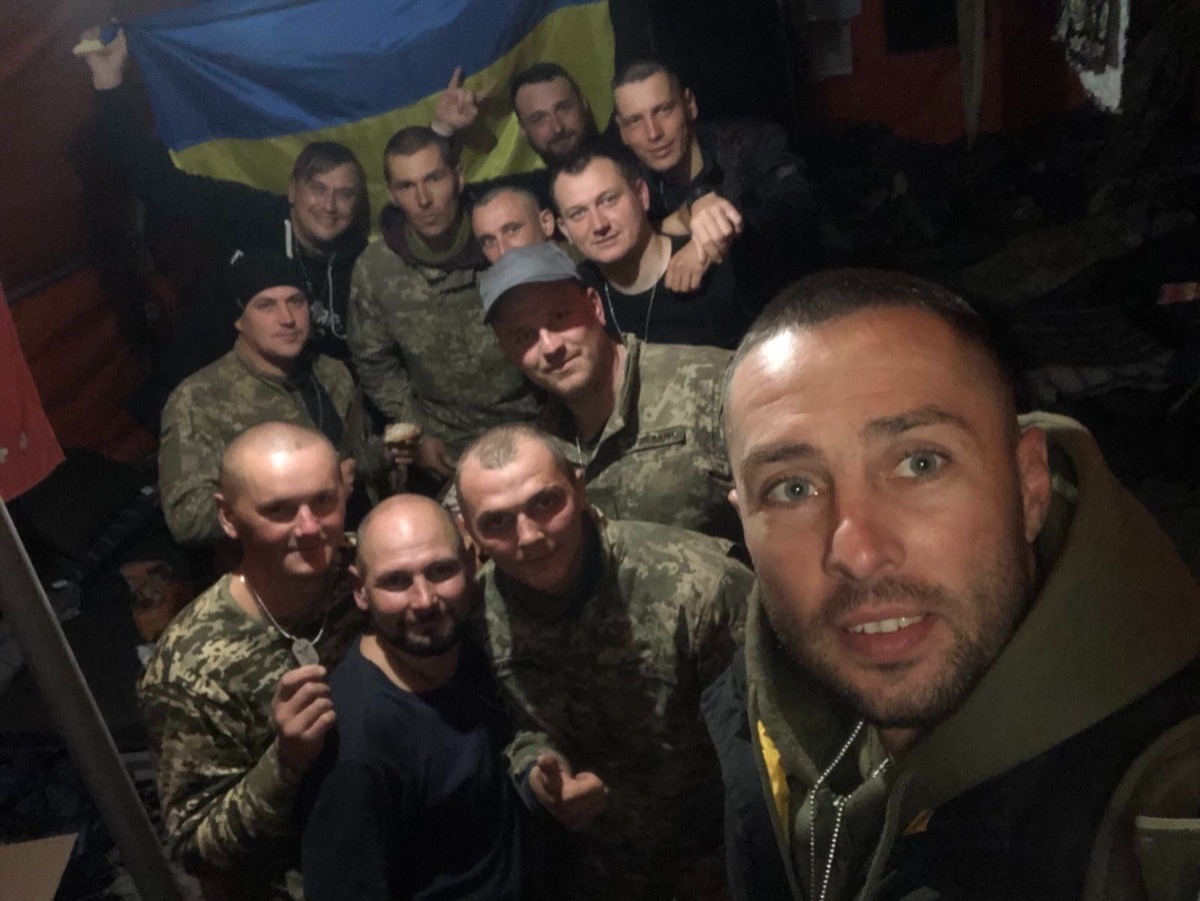
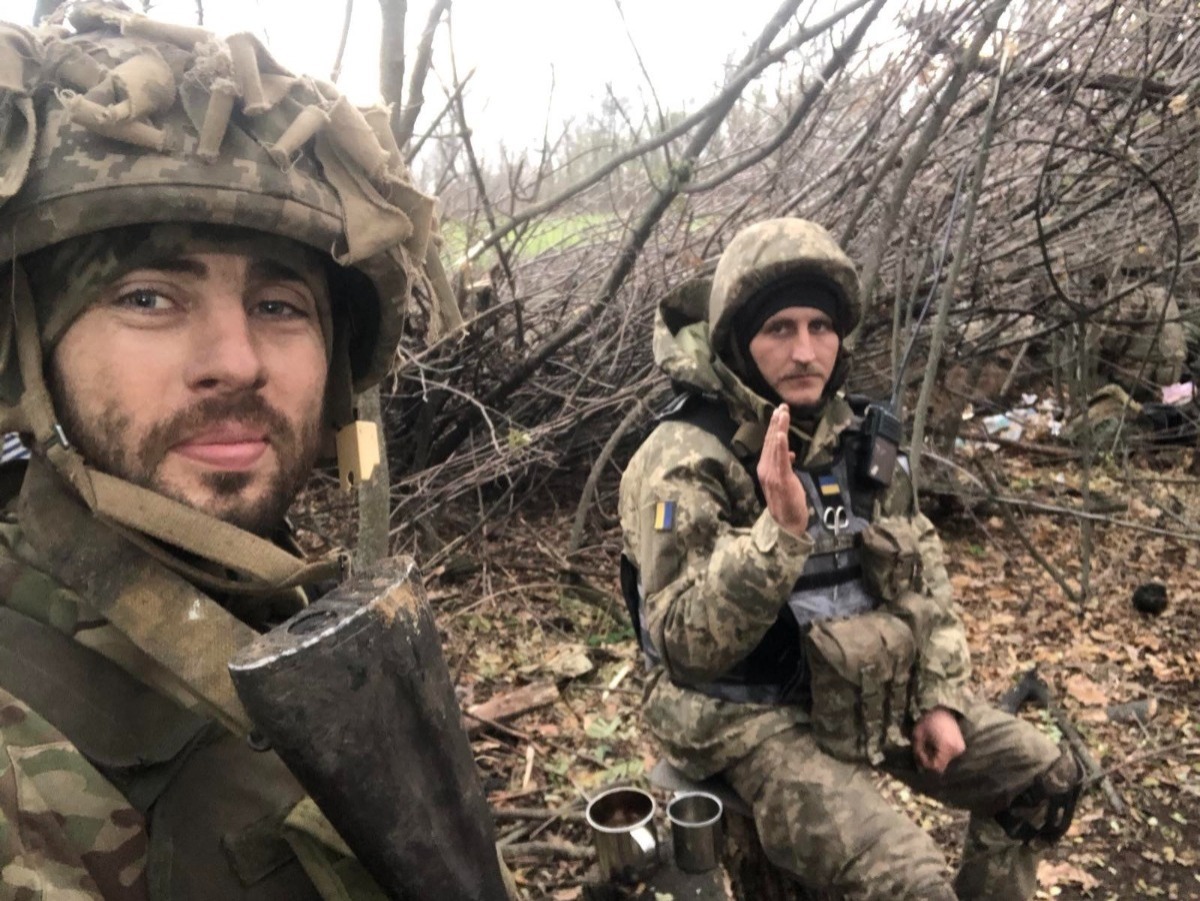
A childhood friend and brother-in-arms
Vadym Yavtushenko completed his military training in Zhytomyr alongside his childhood friend Ivan. The two had been inseparable since first grade. They enlisted together, and when Vadym was called up first, Ivan requested to go with him. On the training grounds, they claimed to be cousins so they could be assigned to the same unit. However, when they reached the front lines, Ivan was sent to the artillery, while Vadym joined the infantry. Still, they remained in close contact.
At the front, Vadym became close friends with Ihor, a soldier from Zhytomyr. Their unit held positions near Terny village in Donetsk Region, just 100 metres from the enemy. There, Vadym truly understood the meaning of combat brotherhood, everyone looked out for one another. Conditions were so dangerous that they often couldn't receive ammunition or food supplies. Yet, they stuck together, sometimes sharing a single cup of tea, but always holding their ground.
If it wasn't for the injury...
Vadym hadn't been able to contact his family for several days and was expecting a package from his sister with extra gear, treats from home, and other essentials for a soldier. The only place with network reception was the commander’s post, but getting there was a challenge, as enemy constantly shelled their positions.
"My friend Ihor had a bad feeling that day and kept telling me not to go to the commander’s post. I didn’t listen and set off with another brother-in-arms. Hardly had I finished talking to my sister, heard the news from home and assured my family I was fine, when a mortar attack began. The enemy must have pinpointed the location of our command post and hit us with fire. I and my brother-in-arms were wounded by shrapnel. We’d already said our goodbyes to each other and mentally prepared for the worst when the shelling stopped, and a military medic rushed over. He checked the tourniquets we'd managed to apply to our wounded limbs and coordinated our extraction. As I was being transported, I kept thinking about my package with the new body armour – I was going to get back to the frontlines," recalls Vadym.
A unique surgery and the strength of Kryvbas
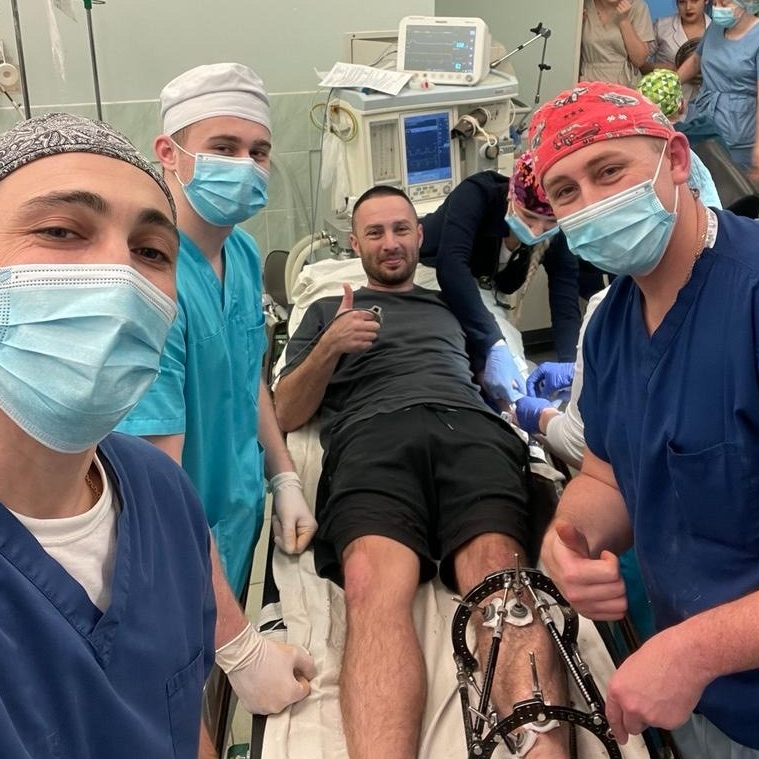
Dobropillia, Novomoskovsk, Vinnytsia, Lviv - military hospitals kept changing, and doctors worked tirelessly to keep Vadym’s injured leg and arm stable until they could perform the main surgery. Over the course of a year, he had 17 surgeries. Eventually, he went to Uzhhorod for long-term treatment.
"My doctor's name is Bohdan, we’re the same age, both 34. I’m incredibly grateful to him for everything he did. Later we learned that American surgeons were coming to Uzhhorod to operate on soldiers with complex injuries, including me. American doctors performed a surgery that had never been done in Ukraine before. To save my severely damaged left leg, they transplanted a fibula, muscles, and blood vessels from my right leg. The operation took eight hours. Our Uzhhorod surgeons said they were amazed, watching every step as their colleagues worked. It was an intricate operation, and the threads used to stitch the vessels under a microscope were finer than human hair. The operation went well, and I’ve been going to Uzhhorod every six months for check-ups since then. I’ve become good friends with the hospital doctors. In fact, my doctor Bohdan was later invited for an internship in the U.S.,” said Vadym with gratitude.
Both foreign volunteer surgeons and Ukrainian doctors were astonished by Vadym’s resilience. Just a few hours after the groundbreaking surgery, he was already sitting in the ICU with his legs crossed, asking when he could start walking. However, while Vadym was healing, any strain on his operated legs was strictly prohibited. An external fixation device controlled by a computer was attached to his leg. Soon, Vadym took his first independent steps, and not long after, he was walking without crutches, with the device still attached.
Six months later, the American doctors returned to Uzhhorod for a medical check-up. They were stunned when he stepped out of the car and walked over to greet them on his own two feet. The doctors joked that the iron ore produced in Kryvyi Rih makes people stronger, and that Vadym’s body had responded phenomenally to the bone graft. Kryvyi Rih orthopedists, reviewing his X-rays, called it nothing short of a surgical miracle.
Dreams and passions
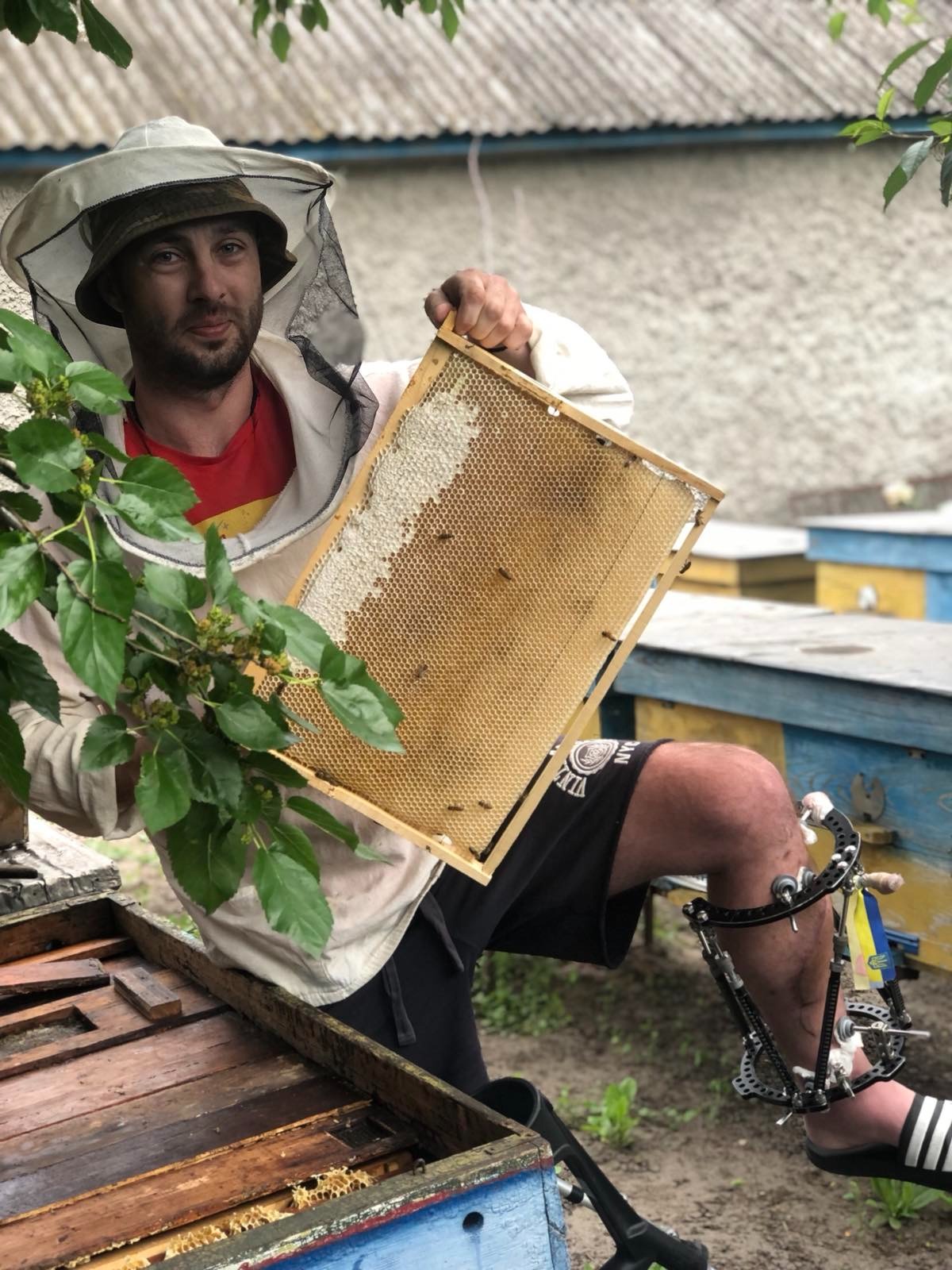
Since childhood, Vadym has nurtured a passion that takes up all his free time. His neighbour kept bees in the village, and young Vadym was always fascinated by it. The neighbour happily shared his knowledge of beekeeping. Today, Vadym keeps beehives and manages 15 bee colonies near his parents’ house. He says this year was dry, so the honey harvest was smaller than expected. He harvested twice and gathered May honey and sunflower honey. Vadym says there’s enough to share with family and friends. His circle of true friends has grown. Vadym dreams of seeing Ivan and Ihor again, and hopes that they are safe and sound, just like the rest of his brothers-in-arms from the 95th Separate Air Assault Brigade who are still holding the Donetsk axis. Ihor jokingly threatens on the phone not to shake his hand when they meet, because Vadym didn’t listen to him that day and got under fire. But those are just words... Vadym is confident that once the war is over, everything will fall into place for all of us.






